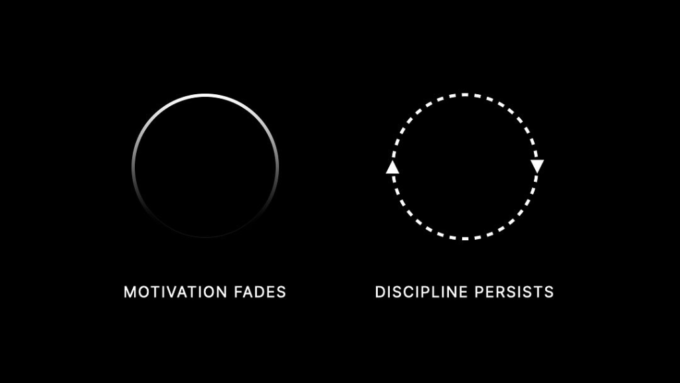
Motivation Vs Discipline – Why You Should Never Rely On Motivation
Why Motivation Fades
Motivation is often temporary and unreliable because its based on emotions, energy levels, and external circumstances. Understanding why it fades will definitely help you to develop systems to stay consistent even when you don’t feel like it, which will fuel your long term success.
One of the biggest misconceptions about motivation that I see people around me having is that they think that it is a constant state allow me to explain what I mean by that. Many people assume that successful individuals are always motivated, but the truth is that motivation is more often that not temporary and unreliable. You can think of it this way; motivation comes in waves and fluctuates based on emotions energy levels, as well as your external circumstances.
Those who succeed in the long run NEVER rely on motivation alone. Instead, they build discipline and habits that allow them to keep going even when motivation fades.
Elaborating on before, your emotions play a huge role in how you feel. When you’re in a good mood, its easy to stay productive. But when stress, frustration or boredom kicks in your motivation will drop, and you will want to do something that spikes your dopamine to feel pleasured rather than engage yourself in boring and menial work.
Some Examples of emotional factors that drain motivation:
- Stress and anxiety – when overwhelmed, your brain shifts its focus to survival (in a way), which makes long term goals seem less important
- Boredom and Repetition – can you imagine working on the same thing every single day again and again for months on end? I can’t. This is also a significant factor which drains motivation
- Fear of failure – Fear of making mistakes can create procrastination, as you are afraid to even start due to the potential of you failing. This also causes your motivation to dwindle.
Motivation thrives on clarity. If your goal is too vague or undefined, it’s easy to feel lost or aimless. Compare these 2 goals:
- Goal 1: “I want to be successful” (vague and hard to measure)
- Goal 2: “I want to improve my 2.4km run time to 9:40 within 3 months” (specific and measurable)
Clear goals provide you with direction and purpose, making it easier to stay engaged and motivated throughout. Think about it this way: For goal 1, how would you even go about achieving it? It is subjective, and could mean something different for each person. There are no actionable steps to take for this goal. However the second one is more objective,. and allows one to decipher exactly what it would take to achieve it.
Our Brains are also wired for instant gratification. We naturally prefer quick rewards over long term benefits, a concept known as delay discounting. It is basically the tendency to prefer smaller immediate rewards over larger delayed rewards, reflecting a decline in perceived value over time.
This is why many people:
- Choose scrolling through social media over studying
- Binge-watch TV instead of exercising
- Procrastinate on important tasks
Instant pleasure often feels more rewarding then working towards something that might take you weeks or months to achieve. However, Discipline is built by resisting these distractions and focusing on long term benefits.
Moreover, if we don’t see results quickly, motivation can fade. This is why many people:
- Quit the gym after a few weeks
- Stop learning and instrument when progress slow
However it is important to remember that most meaningful achievements take time. Instead of expecting overnight success, focus on small wins and trust the process.

Shift Your Focus From Motivation to Discipline
As I mentioned multiple times before, motivation is fleeting, but discipline is consistent and sustainable. Instead of relying on how you feel at any given moment, develop systems and routines that make action non negotiable.
Discipline means:
- Sticking to your commitments even when motivation is low
- Building habits that make success automatic
- prioritizing consistency over intensity
The key to developing discipline is to remove unnecessary decision making. If you schedule your important tasks like workouts, studying, or deep work sessions at the same time each and every day, soon enough, they will become second nature for you. By treating these activities as obligations rather than choices, you will end up eliminating the reliance on fleeting motivation.
Another crucial aspect of discipline is delayed gratification. I talked about instant gratification earlier, and delayed gratification is basically the opposite for it. It is the ability to prioritise long term benefits over immediate comfort. Training yourself to push through discomfort and stay committed, even when results are not immediately visible, builds resilience and long term success as well.
Reignite Your Motivation When You Feel Stuck
Sometimes, motivation fades because we feel stuck in a routine or overwhelmed by challenges. When this happens, it is vital that we try to reignite our motivation. Doing this often requires a fresh perspective.
- Reconnect with your “why” – if something feels off, or you start thinking that there is no point of your hard work, remind yourself of why you started in the first place. A strong emotional relation with your end goal often fuels persistence
- Seek Inspiration – As simple as this method sounds, reading other people’s success stories, listening to motivational content, and surrounding yourself with ambitious people will help you to get back on track, and be disciplined towards working towards your goals as well. However, it is important to note that you do not ONLY consume motivational content and not take any action. read “The Social Media Trap for more information
- Set Micro Goals – large goals can often be overwhelming. It often makes things easier when you break these large goals into smaller and more manageable tasks, so that you do not feel overwhelmed by your large dreams. This will ensure that progress feels achievable, thus pushing you to work towards them.
Build External Systems For Motivation
When you rely solely on internal motivation, its easy to fall of track as it is purely based off your feelings. External systems will help keep you accountable.
- Accountability partners – Have one of your friends to check in with you regularly. This will help you increase commitment and prevents procrastination, as you have someone who will push you every day.
- Public Declarations – Most people often overlook this. Announce your goals publicly. This is what I consider a “mind trick”. It will add social pressure to follow through with your goals.
By building an external environment to push you to be disciplined, you shift the responsibility away from willpower and onto more structured support systems, making it easier to stay committed.
Optimise Your Environment For Success
It is also important to ensure that your environment complements your goals and plans.
Your environment plays a huge role in shaping your behaviour, if your surroundings make bad habits easy and good habits difficult, keeping discipline, at least when you first start, will be close to impossible.
Here are some ways I have optimised my environment, and you can too:
- Reduce distractions – keep your workspace clutter free and minimise access to distractions like social media. Put your phone away, turn on “focus mode” on devices etc.
- Make good choices convenient – Lay out workout clothes the night before, prepare healthy snacks in advance, or organise your study materials for easy access. This way, the best option to take would shift from the bad habit to the good habit, and your brain would prefer doing the good habit as it is easier. This is also a form of tricking your mind
- Surround Yourself with like minded people – One of the Most important points. If a cat lives with a group of dogs for a long time, the cat itself starts behaving like a dog. Likewise, your friend group determines what kind of person you become. If you want to be disciplined and successful, hang around people who have drive and work on themselves. This will further push you to become a better version of yourself
- Design a trigger based system – Set up cues in your environment that signal when to take action. For example, use alarms to indicate when to start studying or when to start working out.
Understand That Action Creates Motivation
Most people I see wait for motivation before taking action, but in reality, action itself creates discipline and motivation. The more you engage in a task, the more invested you will become. This is known as the Progress principle – small wins create momentum, which will fuel further effort. Once you start, you become addicted to the potential you will see in yourself, and will often find it hard to stop.
- Start small – Even 5 minutes of action can break inertia and spark motivation
- Trust the process – focus on showing up every daily instead of constantly worrying about immediate results.
- Use the “Do it for 2 minutes rule” – Commit to just 2 minutes of a task. When you start, you will often keep going.
- Celebrate progress – Acknowledge even minor achievements to reinforce yourself positively. This will also help you stay motivated and eventually disciplined.
Conclusion
Motivation will naturally fade, but that doesn’t mean progress has to stop. Instead of waiting to feel motivated, focus on discipline, habits, and external systems that keep you moving forward.
Most people think that success is about feeling inspired, or motivated, or to have this drive that others don’t. However, this is a common misconception. Success is about showing up on even the hard days, and still giving it your all. If you only have 20% to give, then give the full 20%. This way, you are still giving your 100%. This is one of the most important factors of success.
By understanding that discipline will always take precedency over discipline, you will set yourself up for long term success in ANY area of your life. When your motivation runs out, discipline will always have your back.
When action starts, momentum builds. And with the right environment and systems in place, staying on track becomes second nature.
Keep moving forward, and I assure you, Success will follow.



